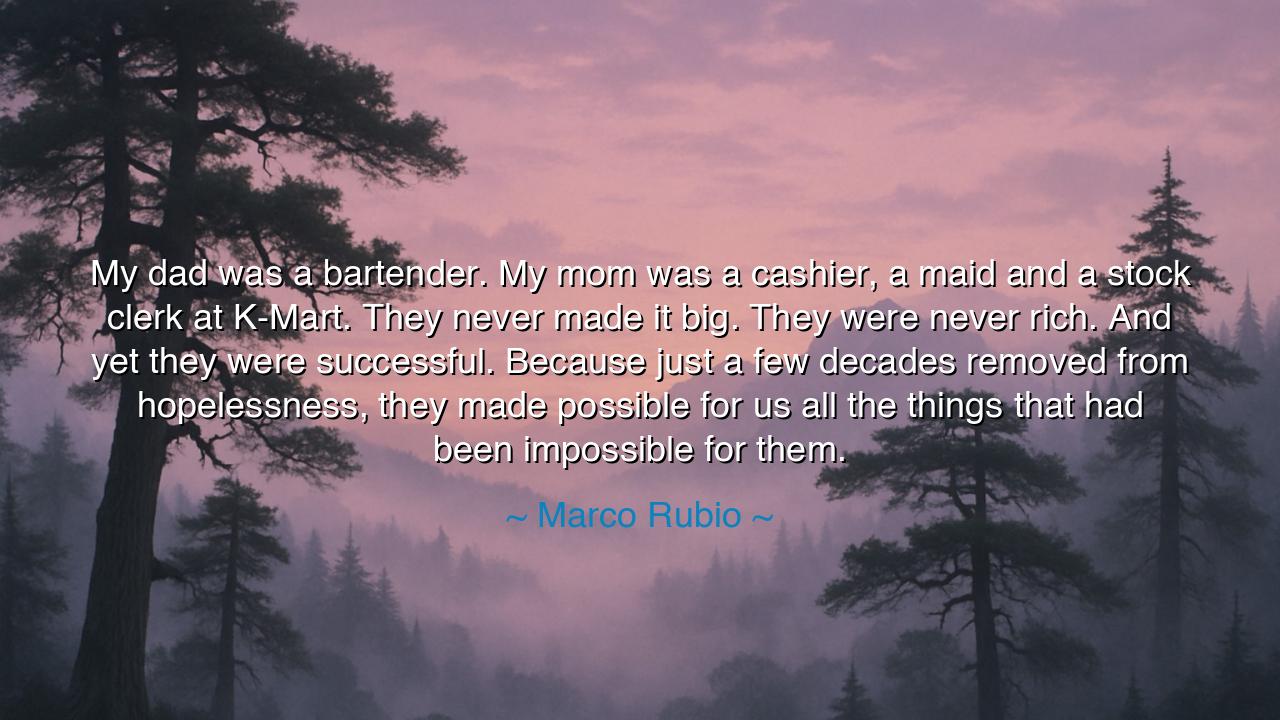
My dad was a bartender. My mom was a cashier, a maid and a stock
My dad was a bartender. My mom was a cashier, a maid and a stock clerk at K-Mart. They never made it big. They were never rich. And yet they were successful. Because just a few decades removed from hopelessness, they made possible for us all the things that had been impossible for them.






In a tone rich with gratitude and reverence, Marco Rubio once said: “My dad was a bartender. My mom was a cashier, a maid and a stock clerk at K-Mart. They never made it big. They were never rich. And yet they were successful. Because just a few decades removed from hopelessness, they made possible for us all the things that had been impossible for them.” These words, though born in the modern age, carry the eternal rhythm of an ancient truth—the truth that success is not measured by wealth, but by legacy, not by comfort, but by sacrifice. In this saying, Rubio honors the quiet heroes of every generation: the parents who, though unseen by history, build the foundation upon which the future stands.
To the ancients, this idea would have been sacred. The Greeks spoke of arete, the excellence of the soul, which was not found in riches or status but in fulfilling one’s duty with honor. Rubio’s parents, though they labored in humble places—a bar, a store, a home—embodied this same excellence. They worked not for fame but for hope, not for themselves but for the generations yet to come. This is the noblest form of success: to transform struggle into opportunity, to give one’s children the wings that one never had.
Rubio’s words spring from the soil of experience. His parents were Cuban immigrants, people who fled hardship and uncertainty in search of freedom. They arrived in a foreign land with little more than courage and a dream. His father, a bartender, served others with dignity; his mother, a maid and cashier, labored long hours so her children could learn, grow, and rise beyond the limits of poverty. Their story is one among millions, yet it shines with the same immortal light—the light of perseverance, of love expressed through labor, of sacrifice made sacred through purpose.
There is a lineage of such heroes in every age. Consider the story of Abraham Lincoln’s parents, who lived in frontier hardship, carving survival out of wilderness. They never knew luxury; their home was built of rough wood, their lives bound by toil. Yet from their endurance came one of history’s greatest leaders, a man whose words and deeds reshaped a nation. The Lincolns, like the Rubios, proved that greatness often begins in obscurity, that the roots of triumph grow deep in the soil of struggle. The world may not remember their names, but their legacy endures in the lives they made possible.
Rubio’s reflection reminds us that hopelessness is not eternal. His parents stood only “a few decades removed” from despair—just a generation or two from those who saw no horizon of possibility. Yet through work and faith, they bridged that gap. They did not amass wealth, but they broke the cycle. Their labor became the foundation of a new future, one where their son could stand before the world and speak not as a servant, but as a leader. Thus, they achieved what all true parents dream of: to make their children’s lives larger than their own.
And herein lies the heart of the quote: the redefinition of success. In an age obsessed with wealth and fame, Rubio’s words remind us that the truest measure of a life is the good it gives forward. The bartender who raises a scholar, the maid who nurtures a healer, the laborer who inspires a poet—these are the architects of civilization. They are the invisible builders whose faith in tomorrow keeps humanity rising. As the ancients taught, a society stands tallest when it honors those who labor in humility but dream with courage.
So let this be the lesson for all who listen: Honor your beginnings. Do not despise humble roots, for from them grow the strongest trees. Remember those who came before you—their long nights, their silent prayers, their calloused hands that worked so yours could reach further. And if you are blessed to stand where they once dreamed of standing, do not forget to lift others as they lifted you. For gratitude is not a feeling; it is a duty, a sacred debt to be repaid through kindness, perseverance, and love.
And thus, as the ancients would conclude, true greatness is not in conquering the world, but in redeeming the past. When a parent’s struggle becomes a child’s freedom, when despair gives birth to possibility, when one life opens the door for many—that is success. The bartender and the maid, through their quiet faith, changed history in their own way. And so, too, can we. By their example, let us work, not only for ourselves, but for the unseen generations yet to come—so that they, too, may look back and say, “They made possible for us all the things that had been impossible for them.”






AAdministratorAdministrator
Welcome, honored guests. Please leave a comment, we will respond soon